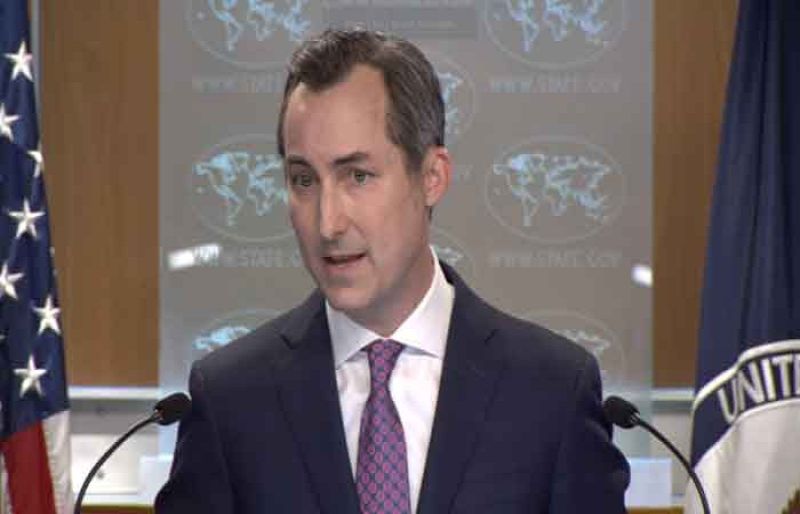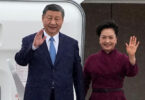US State Department spokesperson Matthew Miller has urged the Taliban not to allow its land to be used by terrorist sanctuaries. During the State Department media news briefing on Monday, the Frontier Post raised the query regarding serious accusations leveled by the Pakistan government against Taliban authorities for harboring terrorist groups and deteriorating the security situation in Pakistan, Matthew Miller categorically declared that the US has always asked the Taliban to follow the Doha agreement and not allow its land to be used for launching terrorists activity against any country.
The bilateral relations between Pakistan and Afghanistan are currently very tense and the security situation in the greater AfPak region has deteriorated significantly, after the Pakistan Army publicly blamed the Taliban leadership in Afghanistan for the consecutive second time in a week, for taking lenient actions against TTP hideouts in their country. The Pakistani military has also warned that if the Taliban leadership continues to ignore this concern of Pakistan then Pakistan can effectively take action against those elements inside Afghanistan. Meanwhile, the military leadership has briefed the parliament regarding the law and order situation in the country and growing concerns about terrorists sanctuaries in neighboring Afghanistan, where Pakistani proscribed Tahreek-e- Taliban Pakistan has established massive terrorism and training infrastructure and avails freedom of movement in Taliban-ruled Afghanistan. Previously, TTP availed those liberties as a special concession during the Ghani rule when Afghan republicans and their close ally India had been using the TTP for launching terrorist activities inside Pakistan, while the TTP operations continue unrestrictedly over the past two years after their ideological mentors, Taliban took control of the country in August 2021.
Over the past months, the issue of terrorism in Pakistan has rebirth after a Taliban-brokered deal between Pakistan and the TTP failed and the banned terror outfit resumed its terrorist activities against Pakistan in November last year. There had been continuous terrorist attacks on Pakistani Law Enforcement Agencies (LEAs) and military installations across Pakistan particularly in Erstwhile FATA and Balochistan that caused grave concerns in the government and the masses regarding the sharp rise of terrorism in the country, while the global community including the UN and the United States were also worried about the security situation in Pakistan’s border regions and inside Afghanistan. The Pakistani authorities urged Kabul time and again, to eliminate terrorist safe havens and take action against the banned terror outfits camped on their soil and operating against the state of Pakistan from inside Afghanistan. However, Afghan interim authorities resisted any effective action against the Taliban’s offshoot and offered multiple suggestions to facilitate the rehabilitation of TTP fighters in Pakistan or some parts of Afghanistan but those plans could not be worked.
Currently, Islamabad and Kabul struck a deadlock over the issue of terrorism, as Pakistan pressing Afghan interim authorities to fulfill their commitments regarding the Doha agreement and also uphold their obligation under the recent trilateral Islamabad Summit between Pakistan, Afghanistan, and China by taking decisive actions against the militant group. Interestingly, a Spokesperson to the Afghan interim government denied the presence of the TTP and any terrorist infrastructure on Afghan soil and termed the TTP a domestic issue of Pakistan that astonished the Pakistani authorities who resultentedly vowed to take action against the terrorist groups camped inside Afghanistan. Currently, the observers in Pakistan, Afghanistan, and the United States think that in the coming days, the world will witness a severe hostility in the relations of two brotherly Muslim nations who always shared each other grief and have a long history of good neighborliness in the past.
In fact, reality neither be changed by verbal statements nor it could be concelled in the broad daylight, despite one faces a vision problem. The global concerns regarding terror safe havens in Afghanistan have grown many folds in recent months while the accusations previously raised by Pakistan have now been joined by the United States, China, and Iran. The Afghan interim authorities must acknowledge the problem that lies inside Afghanistan and all of Afghanistan’s neighbors have great concerns regarding flourishing terrorism in neighboring Afghanistan. Currently, the people of Afghanistan face a serious humanitarian crisis, a lack of livelihood, and shortages of food grains and food staples while millions of Afghan refugees await a dignified return to their nation as the decades long conflict has paused for a while. Realistically, all Muslim nations including first door neighbors Pakistan, Iran, Saudi Arabia, and others stood firmly with the Afghan interim government during the early months of its takeover of Afghanistan and played an admiring role in reducing the economic and humanitarian issues of the Afghan nation. However, a majority of Muslim nations currently contradict Taliban policies regarding human and women’s rights, girls’ education, and terrorism issue that will ultimately have a negative effect on the people of Afghanistan.
Previously, the Taliban sheltered Al-Qaeda after the 9/11 attacks and the Afghan nation suffered death and destruction over the two decades, now the world unanimously calls the incumbent Afghan rulers to shed away from a terrorist group that is involved in terrorism in their friendly nation. The current situation merits wisdom, passion, and dialogue from Pakistan and the Afghan interim government. The Afghan rulers must uphold their national responsibilities under the UN charter and the global community of the world nations. Pakistan had suffered utmost from terrorism and Pakistani forces successfully wiped out terrorism from its soil and they are capable enough to repeat the history once more. However, the Afghan nation would be the biggest loser in any tussle between Pakistan and the Taliban. Hence, the Afghan rulers must review their priorities vis-a-vis terrorism, the TTP, Pakistan, and the interest/benefit of the people of Afghanistan. The government and the people of Pakistan are the biggest supporters of a free, peaceful, and stable Afghanistan, and the same must be reciprocated by the Taliban and the Afghans. Hopefully, sense will prevail and both nations will demonstrate wisdom, and patience in dealing with the thorny issue of terrorism which is a matter of survival for Pakistan and a question of culture and tradition for the Afghans.







